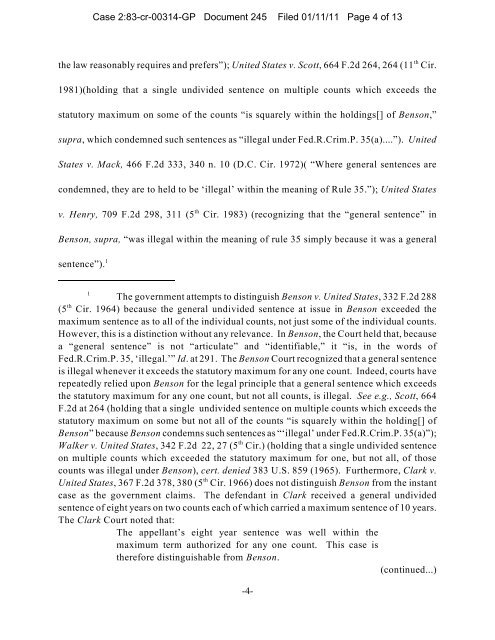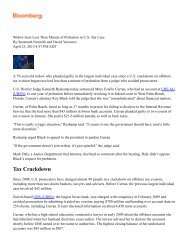Reply Memorandum of Law in Support of Motion to Correct Illegal ...
Reply Memorandum of Law in Support of Motion to Correct Illegal ...
Reply Memorandum of Law in Support of Motion to Correct Illegal ...
Create successful ePaper yourself
Turn your PDF publications into a flip-book with our unique Google optimized e-Paper software.
Case 2:83-cr-00314-GP Document 245 Filed 01/11/11 Page 4 <strong>of</strong> 13<br />
th<br />
the law reasonably requires and prefers”); United States v. Scott, 664 F.2d 264, 264 (11 Cir.<br />
1981)(hold<strong>in</strong>g that a s<strong>in</strong>gle undivided sentence on multiple counts which exceeds the<br />
statu<strong>to</strong>ry maximum on some <strong>of</strong> the counts “is squarely with<strong>in</strong> the hold<strong>in</strong>gs[] <strong>of</strong> Benson,”<br />
supra, which condemned such sentences as “illegal under Fed.R.Crim.P. 35(a)....”). United<br />
States v. Mack, 466 F.2d 333, 340 n. 10 (D.C. Cir. 1972)( “Where general sentences are<br />
condemned, they are <strong>to</strong> held <strong>to</strong> be ‘illegal’ with<strong>in</strong> the mean<strong>in</strong>g <strong>of</strong> Rule 35.”); United States<br />
th<br />
v. Henry, 709 F.2d 298, 311 (5 Cir. 1983) (recogniz<strong>in</strong>g that the “general sentence” <strong>in</strong><br />
Benson, supra, “was illegal with<strong>in</strong> the mean<strong>in</strong>g <strong>of</strong> rule 35 simply because it was a general<br />
sentence”). 1<br />
1<br />
The government attempts <strong>to</strong> dist<strong>in</strong>guish Benson v. United States, 332 F.2d 288<br />
th<br />
(5 Cir. 1964) because the general undivided sentence at issue <strong>in</strong> Benson exceeded the<br />
maximum sentence as <strong>to</strong> all <strong>of</strong> the <strong>in</strong>dividual counts, not just some <strong>of</strong> the <strong>in</strong>dividual counts.<br />
However, this is a dist<strong>in</strong>ction without any relevance. In Benson, the Court held that, because<br />
a “general sentence” is not “articulate” and “identifiable,” it “is, <strong>in</strong> the words <strong>of</strong><br />
Fed.R.Crim.P. 35, ‘illegal.’” Id. at 291. The Benson Court recognized that a general sentence<br />
is illegal whenever it exceeds the statu<strong>to</strong>ry maximum for any one count. Indeed, courts have<br />
repeatedly relied upon Benson for the legal pr<strong>in</strong>ciple that a general sentence which exceeds<br />
the statu<strong>to</strong>ry maximum for any one count, but not all counts, is illegal. See e.g., Scott, 664<br />
F.2d at 264 (hold<strong>in</strong>g that a s<strong>in</strong>gle undivided sentence on multiple counts which exceeds the<br />
statu<strong>to</strong>ry maximum on some but not all <strong>of</strong> the counts “is squarely with<strong>in</strong> the hold<strong>in</strong>g[] <strong>of</strong><br />
Benson” because Benson condemns such sentences as “‘illegal’ under Fed.R.Crim.P. 35(a)”);<br />
th<br />
Walker v. United States, 342 F.2d 22, 27 (5 Cir.) (hold<strong>in</strong>g that a s<strong>in</strong>gle undivided sentence<br />
on multiple counts which exceeded the statu<strong>to</strong>ry maximum for one, but not all, <strong>of</strong> those<br />
counts was illegal under Benson), cert. denied 383 U.S. 859 (1965). Furthermore, Clark v.<br />
th<br />
United States, 367 F.2d 378, 380 (5 Cir. 1966) does not dist<strong>in</strong>guish Benson from the <strong>in</strong>stant<br />
case as the government claims. The defendant <strong>in</strong> Clark received a general undivided<br />
sentence <strong>of</strong> eight years on two counts each <strong>of</strong> which carried a maximum sentence <strong>of</strong> 10 years.<br />
The Clark Court noted that:<br />
The appellant’s eight year sentence was well with<strong>in</strong> the<br />
maximum term authorized for any one count. This case is<br />
therefore dist<strong>in</strong>guishable from Benson.<br />
(cont<strong>in</strong>ued...)<br />
-4-










